Related Research Articles

Edinburgh is the capital city of Scotland and one of its 32 council areas. The city was historically part of the county of Midlothian, but was administered separately from the surrounding county from 1482 on. It is located in Lothian on the southern shore of the Firth of Forth. Edinburgh is Scotland's second-most populous city, after Glasgow, and the seventh-most populous city in the United Kingdom.

Mary, Queen of Scots, also known as Mary Stuart or Mary I of Scotland, was Queen of Scotland from 14 December 1542 until her forced abdication in 1567.
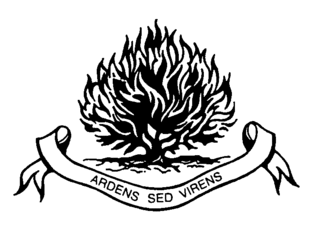
Presbyterianism is a part of the Reformed tradition within Protestantism that broke from the Roman Catholic Church. Presbyterian churches derive their name from the presbyterian form of church government by representative assemblies of elders. Many Reformed churches are organised this way, but the word Presbyterian, when capitalized, is often applied to churches that trace their roots to the Church of Scotland or to English Dissenter groups that formed during the English Civil War.

Robert I, popularly known as Robert the Bruce, was King of Scots from 1306 to his death in 1329. One of the most renowned warriors of his generation, Robert eventually led Scotland during the First War of Scottish Independence against England. He fought successfully during his reign to regain Scotland's place as an independent kingdom and is now revered in Scotland as a national hero.

Scotland is a country that is part of the United Kingdom. Covering the northern third of the island of Great Britain, mainland Scotland has a 96-mile (154-kilometre) border with England to the southeast and is otherwise surrounded by the Atlantic Ocean to the north and west, the North Sea to the northeast and east, and the Irish Sea to the south. It also contains more than 790 islands, principally in the archipelagos of the Hebrides and the Northern Isles. Most of the population, including the capital Edinburgh, is concentrated in the Central Belt—the plain between the Scottish Highlands and the Southern Uplands—in the Scottish Lowlands.

Scottish Gaelic, also known as Scots Gaelic and Gaelic, is a Goidelic language native to the Gaels of Scotland. As a Goidelic language, Scottish Gaelic, as well as both Irish and Manx, developed out of Old Irish. It became a distinct spoken language sometime in the 13th century in the Middle Irish period, although a common literary language was shared by the Gaels of both Ireland and Scotland until well into the 17th century. Most of modern Scotland was once Gaelic-speaking, as evidenced especially by Gaelic-language place names.
The Scottish National Party is a Scottish nationalist and social democratic political party in Scotland. The SNP supports and campaigns for Scottish independence or secession from the United Kingdom and for Scotland's membership of the European Union, with a platform based on civic nationalism. The SNP is the largest political party in Scotland, where it has the most seats in the Scottish Parliament and 45 out of the 59 Scottish seats in the House of Commons at Westminster, and it is the third-largest political party by membership in the United Kingdom, behind the Labour Party and the Conservative Party. The current Scottish National Party leader, Nicola Sturgeon, has served as First Minister of Scotland since 20 November 2014, though she announced her forthcoming resignation from these roles in a press conference on 15 February 2023.
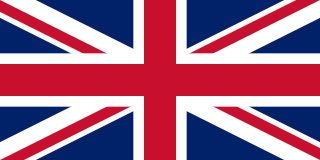
The United Kingdom of Great Britain and Northern Ireland, commonly known as the United Kingdom (UK) or Britain, is a country in Europe, off the north-western coast of the continental mainland. It comprises England, Scotland, Wales and Northern Ireland. The United Kingdom includes the island of Great Britain, the north-eastern part of the island of Ireland, and many smaller islands within the British Isles. Northern Ireland shares a land border with the Republic of Ireland; otherwise, the United Kingdom is surrounded by the Atlantic Ocean, the North Sea, the English Channel, the Celtic Sea and the Irish Sea. The total area of the United Kingdom is 242,495 square kilometres (93,628 sq mi), with an estimated 2020 population of more than 67 million people.
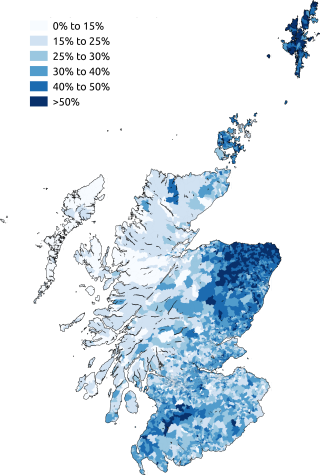
Scots is an Anglic language variety in the West Germanic language family, spoken in Scotland and parts of Ulster in the north of Ireland. Most commonly spoken in the Scottish Lowlands, Northern Isles and northern Ulster, it is sometimes called Lowland Scots or Broad Scots to distinguish it from Scottish Gaelic, the Goidelic Celtic language that was historically restricted to most of the Scottish Highlands, the Hebrides and Galloway after the sixteenth century. Modern Scots is a sister language of Modern English, as the two diverged independently from the same source: Early Middle English (1150–1300).

Glasgow is the most populous city in Scotland and the fourth-most populous city in the United Kingdom, as well as being the 27th largest city by population in Europe. In 2020, it had an estimated population of 635,640. The city was made a county of itself in 1893, prior to which it had been in the historic county of Lanarkshire. The city now forms the Glasgow City Council area, one of the 32 council areas of Scotland, and is governed by Glasgow City Council. It is situated on the River Clyde in the country's West Central Lowlands.
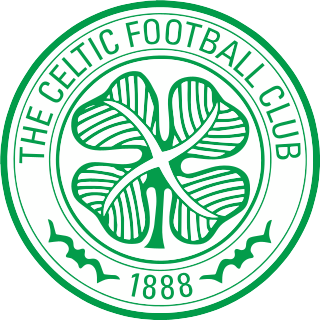
The Celtic Football Club, commonly known as Celtic, is a Scottish professional football club based in Glasgow, which plays in the Scottish Premiership. The club was founded in 1887 with the purpose of alleviating poverty in the immigrant Irish population in the East End of Glasgow. They played their first match in May 1888, a friendly match against Rangers which Celtic won 5–2. Celtic established themselves within Scottish football, winning six successive league titles during the first decade of the 20th century. The club enjoyed their greatest successes during the 1960s and 70s under Jock Stein, when they won nine consecutive league titles and the 1967 European Cup. Celtic have played in green and white throughout their history, adopting hoops in 1903, which have been used ever since.

Rangers Football Club is a Scottish professional football club based in the Govan district of Glasgow which plays in the Scottish Premiership. Although not its official name, it is often referred to as Glasgow Rangers outside Scotland. The fourth-oldest football club in Scotland, Rangers was founded by four teenage boys as they walked through West End Park in March 1872 where they discussed the idea of forming a football club, and played its first match against the now defunct Callander at the Fleshers' Haugh area of Glasgow Green in May of the same year. Rangers' home ground, Ibrox Stadium, designed by stadium architect Archibald Leitch and opened in 1929, is a Category B listed building and the third-largest football stadium in Scotland. The club has always played in royal blue shirts.

James VI and I was King of Scotland as James VI from 24 July 1567 and King of England and Ireland as James I from the union of the Scottish and English crowns on 24 March 1603 until his death in 1625. Although he wanted to bring about a closer union, the kingdoms of Scotland and England remained individual sovereign states, with their own parliaments, judiciaries, and laws, both ruled by James in personal union.

The Scotland national football team represents Scotland in men's international football and is controlled by the Scottish Football Association. It competes in the three major professional tournaments: the FIFA World Cup, UEFA Nations League and the UEFA European Championship. Scotland, as a country of the United Kingdom, is not a member of the International Olympic Committee, and therefore the national team does not compete in the Olympic Games. The majority of Scotland's home matches are played at the national stadium, Hampden Park.
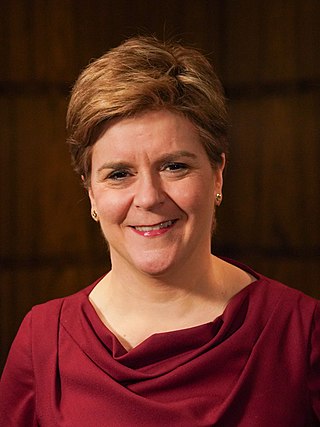
Nicola Ferguson Sturgeon is a Scottish politician serving as First Minister of Scotland and Leader of the Scottish National Party (SNP) since 2014. On 15 February 2023, Sturgeon announced that she would resign as first minister and SNP leader once a new leader is elected. She is the longest-serving first minister of Scotland. She has served as a member of the Scottish Parliament (MSP) since 1999, first as an additional member for the Glasgow electoral region, and as the member for Glasgow Southside from 2007.

The Scotland national rugby union team represents Scotland in men's international rugby union and is administered by the Scottish Rugby Union. The team takes part in the annual Six Nations Championship, where they are the current Calcutta Cup holders. They also participate in the Rugby World Cup, which takes place every four years.

The Scottish Football Association Challenge Cup, commonly known as the Scottish Cup, is an annual association football knock-out cup competition for men's football clubs in Scotland. The competition was first held in 1873–74. Entry is open to all 122 clubs with full membership of the Scottish Football Association (SFA), along with up to eight other clubs who are associate members.
The Scottish League Cup is a football competition open to all Scottish Professional Football League (SPFL) clubs. First held in 1946–47, it is the oldest national League cup in existence. The competition had a straight knockout format but became a group and knockout competition from 2016–17.

Since 1922, the United Kingdom comprises four constituent countries: England, Scotland, and Wales, as well as Northern Ireland. The UK Prime Minister's website has used the phrase "countries within a country" to describe the United Kingdom. Some statistical summaries, such as those for the twelve NUTS 1 regions of the UK, refer to Northern Ireland, Scotland, and Wales as "regions". With regard to Northern Ireland, Scotland and Wales particularly, the descriptive name one uses "can be controversial, with the choice often revealing one's political preferences".
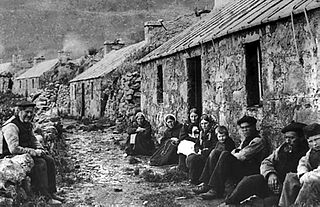
The Scots are an ethnic group and nation native to Scotland. Historically, they emerged in the early Middle Ages from an amalgamation of two Celtic-speaking peoples, the Picts and Gaels, who founded the Kingdom of Scotland in the 9th century. In the following two centuries, the Celtic-speaking Cumbrians of Strathclyde and the Germanic-speaking Angles of north Northumbria became part of Scotland. In the High Middle Ages, during the 12th-century Davidian Revolution, small numbers of Norman nobles migrated to the Lowlands. In the 13th century, the Norse-Gaels of the Western Isles became part of Scotland, followed by the Norse of the Northern Isles in the 15th century.
References
- ↑ MacDonald, Hugh (July 29, 2000), "No Headline Present", The Herald, archived from the original on September 24, 2015, retrieved November 12, 2012